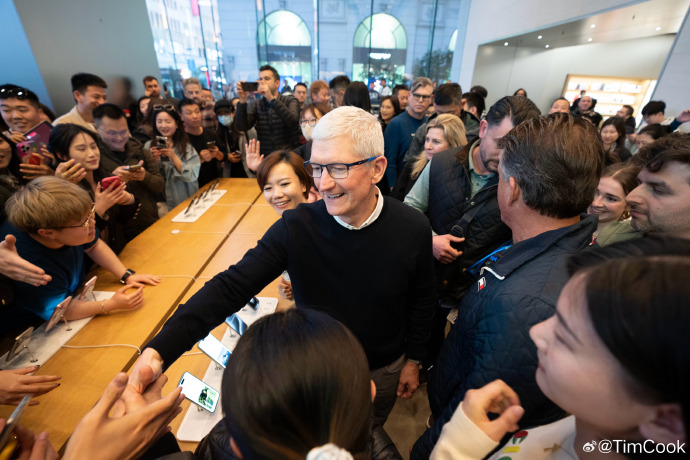
Apple chief Tim Cook is spending a few days in China, one of the tech company’s most important markets and a major manufacturing hub for its products.
His visit comes as iPhone sales in the country dropped 24% year-on-year in the first six weeks of 2024, according to data from Counterpoint Research. The slump was attributed to strong competition from local tech firms such as Huawei, although “abnormally high” sales in January 2023 were also a factor.
Cook arrived in the Asian giant on Wednesday, sharing the news not on X (formerly Twitter) but to his 1.68 million followers on Weibo, the Chinese social media behemoth.
His schedule looks to be a busy one. On Thursday, for example, Cook will open a new Apple Store (below) in the Jing’an district of the massive city of Shanghai.

In one of many upbeat posts shared since his arrival, the Apple CEO said he’d taken a stroll along the famous Bund riverside area with Chinese actor and TV personality Zheng Kai, and enjoyed “a classic Shanghai breakfast,” adding that he’s “always so happy to be back in this remarkable city.”
Cook also paid a visit to the studio of director Mo Lyu, who, according to another of Cook’s posts, uses Apple products “in every stage of the creative process, from storyboarding with iPad to shooting on iPhone 15 Pro Max, to editing with MacBook Pro.”
Later, the Apple boss posted a photo (top) of himself among a crowd of shoppers inside another Shanghai Apple Store — one of seven, soon to be eight, in the city.
In an interview with the China Daily on Wednesday, Cook pointed to the importance of Apple’s “longtime, win-win relationship” with Chinese suppliers, saying, “It’s the partnership between Apple and Chinese companies that really makes things happen.”
But of growing significance regarding Apple’s manufacturing efforts is its recent pivot toward India, with the company aiming to use suppliers there to build a quarter of the world’s iPhones annually within the next three years, according to a Wall Street Journal report in December that cited people familiar with the matter. Apple decided to diversify its manufacturing operations following challenges that emerged during the pandemic and also due to ongoing political tensions between the U.S. and China that could impact supply chains.
But the latest charm offensive by Cook highlights the continuing importance of China to Apple’s bottom line, and its desire to retain the supply chains and factories that it’s spent years developing there.
Editors’ Recommendations
Services Marketplace – Listings, Bookings & Reviews
